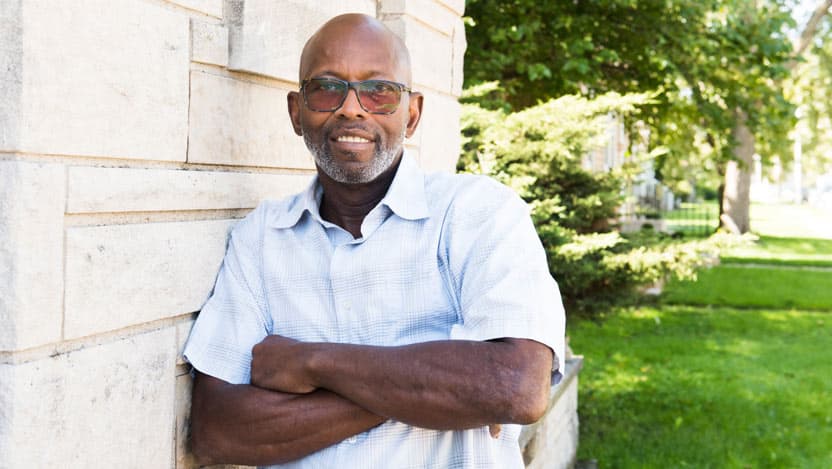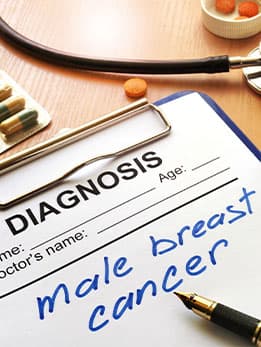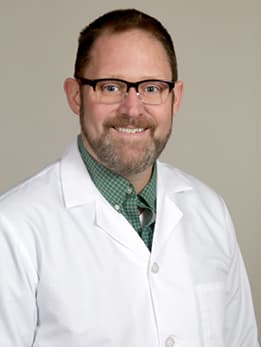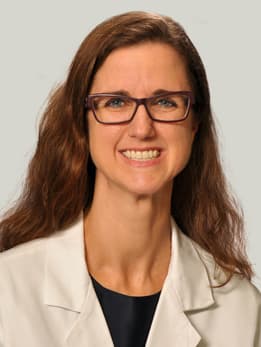Male breast cancer patient tackles the rare disease

Milbert Kennedy was stunned to learn that the swelling and pain in his chest pain was locally advanced breast cancer. An employee of one the sweetest places in Chicago, a chocolate factory, Kennedy, then age 64, was concerned about his ability to maintain his strength for work as he went through cancer treatment.
“I was shocked because I hadn’t heard of any men that had breast cancer,” said Kennedy, who lives in south suburban Riverdale.
Many people don't think men can get breast cancer. But men have a small amount of breast tissue that can develop cancerous tumors. Additionally, breast cancer incidence rates are 52% higher in Black men than in white men, according to James Wallace, MD*, at UChicago Medicine Ingalls. Wallace specializes in the treatment of older patients with cancer.
A genetic test revealed that Kennedy has a BRCA2 gene mutation, which put him at an even higher risk. BRCA is an abbreviation for breast cancer gene, a gene which typically works to suppress tumors. When there's a mutation, BRCA can’t do its job. With a BRCA2 gene mutation, men have a lifetime risk of 6 in 100 to develop breast cancer.
Wallace developed a treatment plan together with Kennedy.
“Milbert's work is physical, and he really wanted to maintain strength and continue working,” he said.
Chemotherapy, Then Surgery
The main part of the tumor was in his breast, but it was also invading the muscle. If surgeons were to operate immediately, they would need to take the entire muscle and breast. The plan was to start with chemotherapy to help preserve the muscle.
During his treatment, Kennedy often brought candy bars for his care team, and continued to work his 2 a.m. shifts at the chocolate factory.
"It is rare for a patient to bring chocolate bars every visit, but he quickly became the nursing and support staff's hero every time he came in,” said Wallace.
After chemotherapy, Nora Jaskowiak, MD, performed a modified radical mastectomy, which involves removal of the entire breast but preserves the pectoralis major muscle, the large muscle in the upper chest that spans from the shoulder to the breastbone.
“People present at more advanced stages all of the time, but this tumor was odd because it was in his breast, but also invading right into his muscle,” said Jaskowiak. “It was worrisome.”
After surgery, Kennedy took two months off from work to heal and also had radiation therapy to get rid of some minute traces of cancer.
Kennedy, now 69, has been cancer free since September 2019.
“I feel good. Even after going through this, I feel healthy,” Kennedy said.
*James Wallace, MD, is a UChicago Medicine Medical Group provider. UChicago Medicine Medical Group comprises UCM Care Network Medical Group, Inc. and Primary Healthcare Associates, S.C. UChicago Medicine Medical Group providers are not employees or agents of the University of Chicago Medical Center, the University of Chicago or UChicago Medicine Ingalls Memorial.

Male Breast Cancer
While the risk is small, every man should be aware of the possibility of developing breast cancer, how to check for it, and when to seek care.
Learn more
James Wallace, MD
James Wallace, MD, is a skilled oncologist with specialty training in geriatrics. He has particular expertise in the treatment of older cancer patients. Dr. Wallace specializes in the assessment of the "oldest old" (age 85 and up) and "frail older" patients (age 65 and up with other medical problems) who seek help in learning how to manage cancer.
Read Dr. Wallace's physician profile
Nora Jaskowiak, MD
Nora Jaskowiak, MD, is an expert in breast surgery and breast cancer, and also specializes in the surgical management of endocrine disorders, including thyroid cancer and parathyroid conditions. She serves as surgical director of UChicago Medicine's Breast Center.
View Dr. Jaskowiak's physician profile